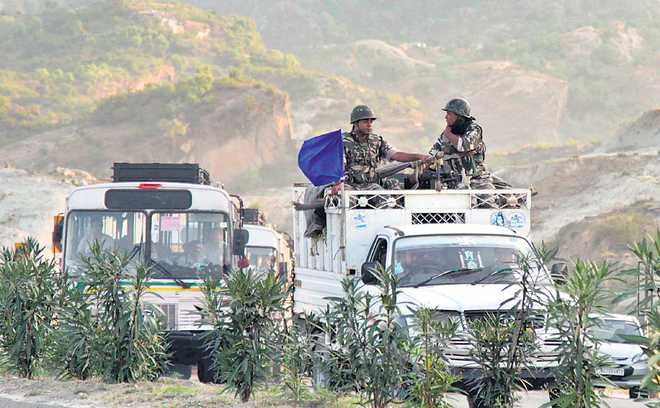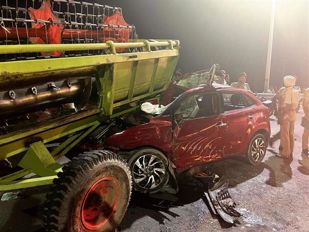
PEACE INITIATIVE: Security forces to halt operations during the month of Ramadan. Tribune Photo: Inderjeet Singh
Arun Joshi
CHIEF Minister Mehbooba Mufti picked her moment on May 10 evening when she called for a unilateral ceasefire for the holy month of Ramadan after an all-party meeting. She had convened the meeting to find a way out of the vortex of violence in which Kashmir is getting squeezed into. The violence was going up — local youth, even highly qualified ones, were joining the ranks of militancy. It was a depressing situation all across the Valley, particularly in South Kashmir that appears on the map as the hotbed of militancy. Distressing details of bloodshed were pouring in daily and it was a blind alley situation, with guns versus guns and stones doing the talking. Dialogue had given way to bloodletting on both sides. It was not a war, but it was an undeclared war, nevertheless.
The CM's call for this initiative for peace also spoke of her compulsions. Her government was facing flak for not doing enough to curb the widening expanse of militancy. She was blamed for not working politically to tame the stone-throwing protesters who were making the forces withdraw from encounter sites to avert civilian casualties. The mounting count of civilian deaths in such incidents and clashes between security forces and stone-throwing crowds led to the charge that her government had launched "state terrorism" at the behest of Delhi against "innocent civilians".
On Tuesday, around 4 pm, when she got a call from Union Home Minister Rajnath Singh informing her that the Centre has directed the "security forces to halt operations during the holy month of Ramadan", she thanked him for responding positively to her proposal, despite criticism by the likes of Defence Minister Nirmala Sitharaman who had declared that there would be no end to the anti-terror operations.
Politically, Mehbooba Mufti gained a stable pedestal as the Centre accepted her way of opening the doors to peace in Kashmir, though only for a limited period. The significance lies not in the duration, but in the fact that the Narendra Modi government has taken the first major political initiative to reach out to the people of Kashmir since it came to power four years ago. There were persistent calls by political parties, particularly Mehbooba Mufti's PDP, that political steps be taken to assuage the hurt feelings of Kashmiris. The PDP-BJP alliance was blamed for crushing the aspirations of the people.
On Tuesday, the Modi government sent a message of goodwill to Kashmir as violence was overshadowing its development-oriented steps. The Kashmir leadership has insisted that it is a political issue and it cannot be resolved even if gold is showered on the people.
However, this initiative is full of risks. This is an experiment the success of which is being calculated only on the basis of possibilities because there is no empirical theory to back it up. The Non-Initiation of Combat Operations announced in November 2000 — coinciding with the start of Ramadan — during Atal Bihari Vajpayee's rule had lasted for six months (till May 31, 2001). The operations had to be called off as militants had regrouped and intensified their assaults on security forces.
At best, it is a good beginning from the Centre's side and the Modi government has attempted to blunt the criticism that its Kashmir policy was based on the hard line approach only. That policy was aimed at eliminating terrorists and they were to be targeted in all circumstances and at all places, no matter whether they were in residential areas or jungles. It was being carried out despite the losses to security forces.
There was revelry in the killing of militant commanders than recognition of the hard reality that such operations were spawning more militants. The number of new recruits this year alone has touched 47. That is an alarming number.
A soft approach at this stage could be seen as a course-correction, provided it is supplemented with other political initiatives in opening dialogue with separatists and Pakistan. That is crucial if this non-military approach has to succeed.
Former Intelligence Bureau Chief Dineshwar Sharma, who was appointed Special Representative in October, last year, has been hobbled in his mission by the ugly events that have taken place since then. But he should not hope to turn the situation with talks that he has held with those who have neither constituency nor public backing.
With the halting of the operations, the Centre has sought to create an opportunity for itself, though it has come quite late in the day. Therefore, it is imperative that it be supplemented with more initiatives before it is too late.
Kashmir, too, has got an opening towards bringing an end to violence as being the expression of political aspirations of the youth who are frustrated by an atmosphere of hopelessness and helplessness.
The proponents who had likened the Indian approach in Kashmir to that of former Pakistan Prime Minister Nawaz Sharif's charge against his country's deep state have been silenced. It is for the Kashmir's leadership, particularly the Chief Minister, to purge her party of such elements who don't distinguish between terrorism as a state policy tool and a foreign policy tool as Pakistan does and the Indian approach of fighting terrorism in a manner in which security personnel suffer casualties and still withdraw from gunfight sites to avert civilian casualties. Pakistan mounted 26/11 — that is a fact.
The youth will pick up the message only when the political leadership broadcasts this "Ramadan" ceasefire with sincerity, without any ifs and buts or partisan narrative.
Separatists who have been using uncharitable remarks against the Modi government for what they allege "unleashing of genocide" and "harassing" the "resistance leadership" with frequent arrests and " false cases" by the National Investigative Agency would have to revisit their narrative, primarily because this is a unilateral ceasefire. There are no conditions, except that the security forces would retaliate if attacked or wherever it becomes necessary to protect the citizens. This is a challenge for them.
The Centre has thrown the ball in the court of the political and separatist leadership of Kashmir. Mehbooba has done her bit by asking all to respond positively. The others need to follow suit.



























